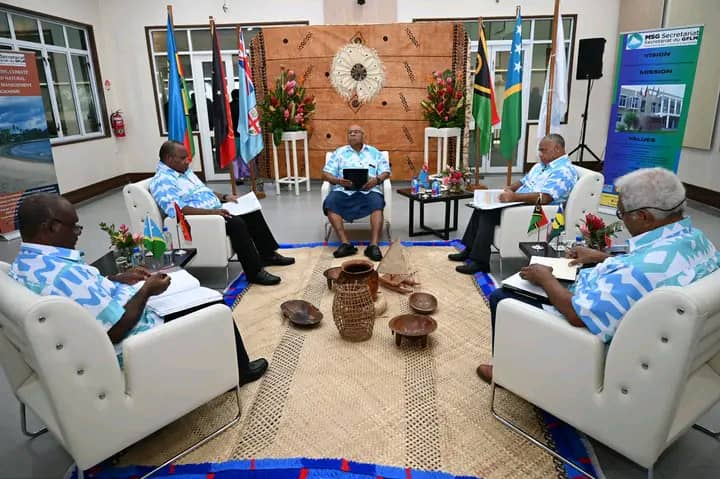Wednesday 25th June, 2025
Papua New Guinea Prime Minister James Marape has called for stronger unity and cooperation among Melanesian countries, saying the region must face growing global and regional challenges together.
Speaking at the 23rd Melanesian Spearhead Group (MSG) Leaders’ Summit in Suva, Fiji, Prime Minister Marape thanked the Fijian Government for their hospitality and acknowledged the leadership of Vanuatu in the previous term.
He said PNG’s 50th year of independence is not just a national milestone, but also a moment to recommit to regional unity.
“For five decades, we have walked the path of nation-building,” Marape said.
“But we have never walked it alone. We are Melanesians first — by language, culture, ancestry, and geography.”
He warned that the region is under pressure from climate change, economic struggles, border insecurity, and growing international competition.
“This is not a time for fragmented leadership or siloed thinking,” he said. “This is a time for bold, cooperative action.”
Marape shared that he had taken part in high-level political discussions with Pacific leaders and encouraged reforms to make regional organizations like the MSG and Pacific Islands Forum more effective.
On the proposed visit by MSG Foreign Ministers to West Papua, Marape made PNG’s position clear: “Papua New Guinea respectfully does not support this proposition.”
He said the issue of West Papua is already being handled at the highest level through the Pacific Islands Forum and that “to now conduct a Foreign Ministers’ visit would downgrade the level of engagement and risk undermining the carefully constructed and respectful pathway we have developed with Indonesia.”
Marape also voiced strong support for the Kanak people of New Caledonia, saying, “The right to self-determination is enshrined in international law and must be respected.”
He called for continued dialogue and peaceful political solutions under the guidance of the United Nations.
He raised concerns over the recent recommendation to hire an independent consultant for the appointment of the MSG Secretariat’s Director General, saying, “This position is a political appointment and must remain within the prerogative of MSG Leaders.”
Marape stressed that any appointments must follow the MSG Agreement and not rely on past ad hoc arrangements. He also recommended that member countries second staff to help the MSG Secretariat carry out leaders’ decisions, some of which he noted have seen no progress for over ten years.
Marape called for clearer guidelines on who can become an Associate Member or Observer, saying the current criteria are vague and can lead to confusion.
“The Secretariat should present updated membership guidelines at the next Senior Officials Meeting,” he added.
Although PNG has not signed the MSG Free Trade Agreement (MSGFTA) yet, Marape said his government remains committed and is working to resolve technical issues.
“We see the MSGFTA as critical to building our economic resilience and unlocking intra-Melanesian trade potential,” he said.
He announced the opening of PNG’s northern land border crossing at Wutung, which will allow land travel into Jayapura, Indonesia.
“This reflects PNG’s commitment to enhancing regional connectivity, mobility, and trade in our shared border zone,” he said.
Marape also confirmed that PNG will host the next MSG Prime Ministers’ Cup, calling it “a celebration not only of football, but of our shared identity as Melanesians.”
He ended his speech with a strong message on climate change, supporting Vanuatu’s push for an International Court of Justice advisory opinion and backing carbon markets that benefit local communities. “We believe in Pacific solutions to Pacific problems,” he said.
“Let us turn our discussions into decisions, and our decisions into action,” Marape said.
“As Papua New Guinea enters its next 50 years, we do so as part of a Melanesian family that is stronger together — and unshakable in its purpose.”

